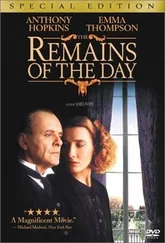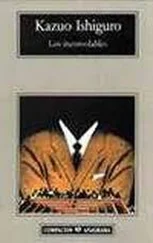“It may not help you much. But just you remember this. There’s at least one person here at Hailsham who believes otherwise. At least one person who believes you’re a very good student, as good as any she’s ever come across, never mind how creative you are.”
“She wasn’t having you on, was she?” I asked Tommy. “It wasn’t some clever way of telling you off?”
“It definitely wasn’t anything like that. Anyway…” For the first time he seemed worried about being overheard and glanced over his shoulder towards the house. The Juniors at the window had lost interest and gone; some girls from our year were walking towards the pavilion, but they were still a good way off. Tommy turned back to me and said almost in a whisper:
“Anyway, when she said all this, she was shaking.”
“What do you mean, shaking?”
“Shaking. With rage. I could see her. She was furious. But furious deep inside.”
“Who at?”
“I wasn’t sure. Not at me anyway, that was the most important thing!” He gave a laugh, then became serious again. “I don’t know who she was angry with. But she was angry all right.”
I stood up again because my calves were aching. “It’s pretty weird, Tommy.”
“Funny thing is, this talk with her, it did help. Helped a lot. When you were saying earlier on, about how things seemed better for me now. Well, it’s because of that. Because afterwards, thinking about what she’d said, I realised she was right, that it wasn’t my fault. Okay, I hadn’t handled it well. But deep down, it wasn’t my fault. That’s what made the difference. And whenever I felt rocky about it, I’d catch sight of her walking about, or I’d be in one of her lessons, and she wouldn’t say anything about our talk, but I’d look at her, and she’d sometimes see me and give me a little nod. And that’s all I needed. You were asking earlier if something had happened. Well, that’s what happened. But Kath, listen, don’t breathe a word to anyone about this, right?”
I nodded, but asked: “Did she make you promise that?”
“No, no, she didn’t make me promise anything. But you’re not to breathe a word. You’ve got to really promise.”
“All right.” The girls heading for the pavilion had spotted me and were waving and calling. I waved back and said to Tommy: “I’d better go. We can talk more about it soon.”
But Tommy ignored this. “There’s something else,” he went on. “Something else she said I can’t quite figure out. I was going to ask you about it. She said we weren’t being taught enough, something like that.”
“Taught enough? You mean she thinks we should be studying even harder than we are?”
“No, I don’t think she meant that. What she was talking about was, you know, about us. What’s going to happen to us one day. Donations and all that.”
“But we have been taught about all that,” I said. “I wonder what she meant. Does she think there are things we haven’t been told yet?”
Tommy thought for a moment, then shook his head. “I don’t think she meant it like that. She just thinks we aren’t taught about it enough. Because she said she’d a good mind to talk to us about it herself.”
“About what exactly?”
“I’m not sure. Maybe I got it all wrong, Kath, I don’t know. Maybe she was meaning something else completely, something else to do with me not being creative. I don’t really understand it.”
Tommy was looking at me as though he expected me to come up with an answer. I went on thinking for a few seconds, then said:
“Tommy, think back carefully. You said she got angry…”
“Well, that’s what it looked like. She was quiet, but she was shaking.”
“All right, whatever. Let’s say she got angry. Was it when she got angry she started to say this other stuff? About how we weren’t taught enough about donations and the rest of it?”
“I suppose so…”
“Now, Tommy, think. Why did she bring it up? She’s talking about you and you not creating. Then suddenly she starts up about this other stuff. What’s the link? Why did she bring up donations? What’s that got to do with you being creative?”
“I don’t know. There must have been some reason, I suppose. Maybe one thing reminded her of the other. Kath, you’re getting really worked up about this yourself now.”
I laughed, because he was right: I’d been frowning, completely lost in my thoughts. The fact was, my mind was going in various directions at once. And Tommy’s account of his talk with Miss Lucy had reminded me of something, perhaps a whole series of things, little incidents from the past to do with Miss Lucy that had puzzled me at the time.
“It’s just that…” I stopped and sighed. “I can’t quite put it right, not even to myself. But all this, what you’re saying, it sort of fits with a lot of other things that are puzzling. I keep thinking about all these things. Like why Madame comes and takes away our best pictures. What’s that for exactly?”
“It’s for the Gallery.”
“But what is her gallery? She keeps coming here and taking away our best work. She must have stacks of it by now. I asked Miss Geraldine once how long Madame’s been coming here, and she said for as long as Hailsham’s been here. What is this gallery? Why should she have a gallery of things done by us?”
“Maybe she sells them. Outside, out there, they sell everything.”
I shook my head. “That can’t be it. It’s got something to do with what Miss Lucy said to you. About us, about how one day we’ll start giving donations. I don’t know why, but I’ve had this feeling for some time now, that it’s all linked in, though I can’t figure out how. I’ll have to go now, Tommy. Let’s not tell anyone yet, about what we’ve been saying.”
“No. And don’t tell anyone about Miss Lucy.”
“But will you tell me if she says anything else to you like that?”
Tommy nodded, then glanced around him again. “Like you say, you’d better go, Kath. Someone’s going to hear us soon.”
The gallery Tommy and I were discussing was something we’d all of us grown up with. Everyone talked about it as though it existed, though in truth none of us knew for sure that it did. I’m sure I was pretty typical in not being able to remember how or when I’d first heard about it. Certainly, it hadn’t been from the guardians: they never mentioned the Gallery, and there was an unspoken rule that we should never even raise the subject in their presence.
I’d suppose now it was something passed down through the different generations of Hailsham students. I remember a time when I could only have been five or six, sitting at a low table beside Amanda C., our hands clammy with modelling clay. I can’t remember if there were other children with us, or which guardian was in charge. All I remember is Amanda C.—who was a year older than me—looking at what I was making and exclaiming: “That’s really, really good, Kathy! That’s so good! I bet that’ll get in the Gallery!”
I must by then have already known about the Gallery, because I remember the excitement and pride when she said that—and then the next moment, thinking to myself: “That’s ridiculous. None of us are good enough for the Gallery yet.”
As we got older, we went on talking about the Gallery. If you wanted to praise someone’s work, you’d say: “That’s good enough for the Gallery.” And after we discovered irony, whenever we came across any laughably bad work, we’d go: “Oh yes! Straight to the Gallery with that one!”
But did we really believe in the Gallery? Today, I’m not sure. As I’ve said, we never mentioned it to the guardians and looking back, it seems to me this was a rule we imposed on ourselves, as much as anything the guardians had decided. There’s an instance I can remember from when we were about eleven. We were in Room 7 on a sunny winter’s morning. We’d just finished Mr. Roger’s class, and a few of us had stayed on to chat with him. We were sitting up on our desks, and I can’t remember exactly what we were talking about, but Mr. Roger, as usual, was making us laugh and laugh. Then Carole H. had said, through her giggles: “You might even get it picked for the Gallery!” She immediately put her hand over her mouth with an “oops!” and the atmosphere remained light-hearted; but we all knew, Mr. Roger included, that she’d made a mistake. Not a disaster, exactly: it would have been much the same had one of us let slip a rude word, or used a guardian’s nickname to his or her face. Mr. Roger smiled indulgently, as though to say: “Let it pass, we’ll pretend you never said that,” and we carried on as before.
Читать дальше












